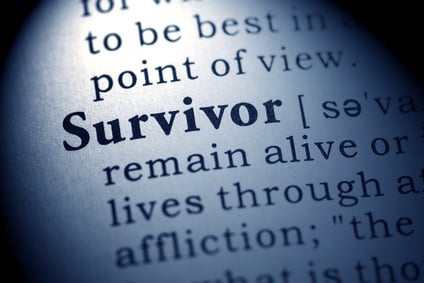Mental Health Resources for Suicide Survivors
Mental Health Resources for Suicide Survivors

The loss of a loved one to suicide is a far too common tragedy. In 2017 alone, 47,173 people in the United States died by suicide [1] and it is estimated that an average of 135 people are exposed to each suicide death [2]. These suicide survivors include immediate and extended family members, friends, coworkers, classmates, and any others who were close to the deceased. Following a suicide loss, survivors may experience profound distress and emotional pain as well as feelings of stigma, guilt, and shame [3]. While intense grief is a normal, universal response to loss, suicide loss is a significant stressor that can result in serious and persistent mental health issues for some survivors.
What mental health problems may affect suicide survivors?
Complicated grief: Although there is no single way to grieve and loss is permanent, acute grief symptoms (such as feelings of shock, sadness, and yearning) usually lessen in intensity over time, enabling the bereaved to reengage with life. However, approximately 10% of bereaved people find that grief persists with substantial distress and impairment for years after a loss – a condition called complicated grief [CG; 4]. CG is diagnosed when grief and related symptoms remain severe beyond the first year. Risk for CG is elevated after suicide loss [5], and CG symptoms are associated with increased risk for suicidal ideation and behavior [6].
Posttraumatic stress disorder: The suicide of a loved one can also lead to posttraumatic stress disorder [PTSD; 7]. People with PTSD typically experience intrusive thoughts and memories about the details of the death itself. They might experience nightmares or flashbacks. Suicide loss is particularly likely to cause PTSD compared to non-violent kinds of losses [7, 8].
Major depressive disorder: The death of a loved one can also lead to major depressive disorder [9], which can be diagnosed even in the aftermath of a death. People with major depressive disorder experience symptoms like persistent sadness, loss of interest in activities, and sleep and appetite disturbance.
Suicidal thoughts and behaviors: Suicide survivors may be at increased risk for suicide themselves, particularly if they lost a romantic partner or child to suicide [10]. This risk is even higher if the suicide survivor has a mental health diagnosis such as CG, PTSD, or major depressive disorder [6, 11].
What mental health treatments are available for suicide survivors?
Fortunately, many treatment options are available for suicide survivors [12]. The first step is to see a mental health professional who can provide an accurate assessment and diagnosis, and recommend the most appropriate treatment.
Complicated grief: The best-studied treatment for complicated grief is Complicated Grief Treatment (CGT). CGT is a 16-session therapy that helps people identify and overcome factors interfering with recovery, such as ruminating about the death or deceased loved one, avoidance, and overwhelming emotions [13]. You can find a therapist who is trained in CGT here. Cognitive Behavioral Therapy (CBT) targeting grief, and for some, selective serotonin reuptake inhibitors and grief support groups may also be helpful [14].
Posttraumatic stress disorder: The American Psychological Association strongly recommends four types of therapy for PTSD: Cognitive Behavioral Therapy (CBT), Cognitive Processing Therapy (CPT), Cognitive Therapy (CT), and Prolonged Exposure (PE). These therapies are fairly brief (approximately 12 sessions) and help people process upsetting thoughts and emotions about a traumatic event to support recovery.
Major depressive disorder: Many treatments are available for major depressive disorder. You can find a description of the different treatment options – from medications to talk therapies like Cognitive Behavioral Therapy (CBT) and Interpersonal Therapy (IPT) to Electroconvulsive Therapy (ECT) – here. People who have both CG and major depressive disorder may benefit from combined treatment with CGT and an antidepressant medication [13]
Suicidal thoughts and behaviors: Though we still need more research on treatments for suicidal thoughts and behaviors, certain medications and talk therapies like Cognitive Behavioral Therapy (CBT) and Dialectical Behavior Therapy (DBT) can be helpful for suicidal individuals [15]. Other recommended brief strategies include safety planning and reducing a person’s access to lethal means [16, 17]. Crisis support services that can be accessed 24/7 through your smartphone or online like the National Suicide Prevention Lifeline (1-800-273-TALK [8255]) also exist. You can find more information about suicide prevention strategies here.
How can I support a suicide survivor?
Friends and family can support suicide survivors by helping them access mental health resources if they seem intensely distressed or are showing signs of the mental health problems described above. Offering non-judgmental social and emotional support, including an open invitation to talk about loss-related thoughts and feelings can also be helpful [18].
References
- CDC. Fatal Injury Reports, National, Regional and State, 1981-2017. 2019 April 24, 2019]; Available from: https://webappa.cdc.gov/sasweb/ncipc/mortrate.html.
- Cerel, J., et al., How many people are exposed to suicide? Not six. Suicide and life-threatening behavior, 2018. 49(2): p. 529-534.
- Pitman, A., et al., The stigma perceived by people bereaved by suicide and other sudden deaths: A cross-sectional UK study of 3432 bereaved adults. Journal of Somatic Research, 2016. 87: p. 22-29.
- Lundorff, M., et al., Prevalence of prolonged grief disorder in adult bereavement: A systematic review and meta-analysis. Journal of Affective Disorders, 2017. 212: p. 138-149.
- Kristensen, P., L. Weisaeth, and T. Heir, Bereavement and mental health after sudden and violent losses: A review. Psychiatry, 2012. 75(1): p. 76-97.
- Szanto, K., et al., Indirect self-destrutive behavior and overt suicidality in patients with complicated grief. Journal of Clinical Psychiatry, 2006. 67(2): p. 233-239.
- Bonanno, G.A. and S. Kaltman, The varieties of grief experience. Clinical Psychology Review, 2001. 21(5): p. 705-734.
- Djelantik, A.M.J., et al., Symptoms of prolonged grief, posttraumatic stress, and depression after loss in a Dutch community sample: A latent class analysis. Psychiatry Research, 2017. 247: p. 276-281.
- Zisook, S. and S.R. Schuchter, Depression through the first year after the death of a spouse. Americal Journal of Psychiatry, 1991. 148(10): p. 1346-1352.
- Pitman, A., et al., Effects of suicide bereavement on mental health and suicide risk. Lancet Psychiatry, 2014. 1: p. 86-94.
- Nock, M.K., et al., Mental disorders, comorbidity, and suicidal behavior: Results from the National Comorbidity Survey Replication. Molecular Psychiatry, 2009. 15(8): p. 868-876.
- Andriessen, K., et al., Effectiveness of interventions for people bereaved through suicide: A systematic review of controlled studies of grief, psychosocial, and suicide-related outcomes. BMC Psychiatry, 2019. 19(49).
- Shear, M.K., et al., Optimizing the treatment of complicated grief. JAMA Psychiatry, 2016. 73(7): p. 685-694.
- Simon, N., Treating complicated grief. JAMA, 2013. 310(4): p. 416-423.
- Brown, G.K. and S. Jager-Hyman, Evidence-based psychotherapies for suicide prevention: Future directions. American Journal of Preventative Medicine, 2014. 47(3 Suppl 2): p. S186-194.
- Zalsman, G., et al., Suicide prevention strategies revisited: 10-year systematic review. Lancet Psychiatry, 2016. 3(7): p. 646-659.
- McCabe, R., et al., Effectiveness of brief psychological interventions for suicidal presentations: A systematic review. BMC Psychiatry, 2018. 18(120).
- Levi-Belz, Y. and L. Lev-Ari, Is there anybody out there? Attachment style and interpersonal facilitators as protective factors against complicated grief among suicide-loss survivors. Journal of Nervous and Mental Disease, 2019. 207: p. 131-136.
Also co-written by Nicole LeBlanc. Ms. LeBlanc is a doctoral candidate in clinical psychology at Harvard University, where she conducts research on the association between social factors and the development and maintenance of emotional disorders. She is also a current clinical fellow in the department of psychology at Massachusetts General Hospital, where she is completing clinical and research training with the Cognitive Behavioral Therapy Program and the Center for Anxiety and Traumatic Stress Disorders. Her clinical interests include empirically-supported treatments for anxiety and traumatic stress disorders.













